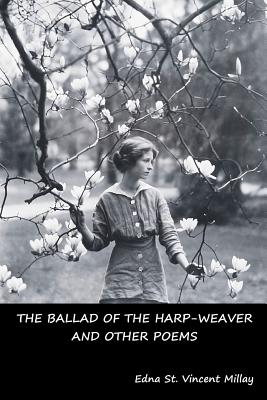The Ballad of the Harp-Weaver and Other Poems

The Ballad of the Harp-Weaver and Other Poems
Edna St. Vincent Millay, (born February 22, 1892, Rockland, Maine, U.S.--died October 19, 1950, Austerlitz, New York), American poet and dramatist who came to personify romantic rebellion and bravado in the 1920s.Millay was reared in Camden, Maine, by her divorced mother, who recognized and encouraged her talent in writing poetry. Her first published poem appeared in the St. Nicholas Magazine for children in October 1906. She remained at home after her graduation from high school in 1909, and in four years she published five more poems in St. Nicholas. Her first acclaim came when "Renascence" was included in The Lyric Year in 1912; the poem brought Millay to the attention of a benefactor who made it possible for her to attend Vassar College. She graduated in 1917.In that year Millay published her first book, Renascence and Other Poems, and moved to Greenwich Village in New York City. There she became a lively and admired figure among the avant garde and radical literary set. To support herself Millay, under the pseudonym "Nancy Boyd," submitted hackwork verse and short stories to magazines, and while her ambition to go on the stage was short-lived, she worked with the Provincetown Players for a time and later wrote the one-act Aria da Capo (1920) for them. The same year she published the verse collection A Few Figs from Thistles, from which the line "My candle burns at both ends" derives. The poem was taken up as the watchword of the "flaming youth" of that era and brought her a renown that she came to despise. In 1921 she published Second April and two more plays, Two Slatterns and a King and The Lamp and the Bell. She also began a two-year European sojourn, during which she was a correspondent for Vanity Fair.Millay won a Pulitzer Prize in 1923 for Ballad of the Harp-Weaver (1922) and married Eugen Jan Boissevain, a Dutch businessman with whom from 1925 she lived in a large, isolated house in the Berkshire foothills near Austerlitz, New York. In 1925 the Metropolitan Opera Company commissioned her to write an opera with Deems Taylor. The resulting work, The King's Henchman, first produced in 1927, became the most popular American opera up to its time and, published in book form, sold out four printings in 20 days.Millay's youthful appearance, the independent, almost petulant tone of her poetry, and her political and social ideals made her a symbol of the youth of her time. In 1927 she donated the proceeds from her poem "Justice Denied in Massachusett
PRP: 107.49 Lei
Acesta este Prețul Recomandat de Producător. Prețul de vânzare al produsului este afișat mai jos.
96.74Lei
96.74Lei
107.49 LeiLivrare in 2-4 saptamani
Descrierea produsului
Edna St. Vincent Millay, (born February 22, 1892, Rockland, Maine, U.S.--died October 19, 1950, Austerlitz, New York), American poet and dramatist who came to personify romantic rebellion and bravado in the 1920s.Millay was reared in Camden, Maine, by her divorced mother, who recognized and encouraged her talent in writing poetry. Her first published poem appeared in the St. Nicholas Magazine for children in October 1906. She remained at home after her graduation from high school in 1909, and in four years she published five more poems in St. Nicholas. Her first acclaim came when "Renascence" was included in The Lyric Year in 1912; the poem brought Millay to the attention of a benefactor who made it possible for her to attend Vassar College. She graduated in 1917.In that year Millay published her first book, Renascence and Other Poems, and moved to Greenwich Village in New York City. There she became a lively and admired figure among the avant garde and radical literary set. To support herself Millay, under the pseudonym "Nancy Boyd," submitted hackwork verse and short stories to magazines, and while her ambition to go on the stage was short-lived, she worked with the Provincetown Players for a time and later wrote the one-act Aria da Capo (1920) for them. The same year she published the verse collection A Few Figs from Thistles, from which the line "My candle burns at both ends" derives. The poem was taken up as the watchword of the "flaming youth" of that era and brought her a renown that she came to despise. In 1921 she published Second April and two more plays, Two Slatterns and a King and The Lamp and the Bell. She also began a two-year European sojourn, during which she was a correspondent for Vanity Fair.Millay won a Pulitzer Prize in 1923 for Ballad of the Harp-Weaver (1922) and married Eugen Jan Boissevain, a Dutch businessman with whom from 1925 she lived in a large, isolated house in the Berkshire foothills near Austerlitz, New York. In 1925 the Metropolitan Opera Company commissioned her to write an opera with Deems Taylor. The resulting work, The King's Henchman, first produced in 1927, became the most popular American opera up to its time and, published in book form, sold out four printings in 20 days.Millay's youthful appearance, the independent, almost petulant tone of her poetry, and her political and social ideals made her a symbol of the youth of her time. In 1927 she donated the proceeds from her poem "Justice Denied in Massachusett
Detaliile produsului










